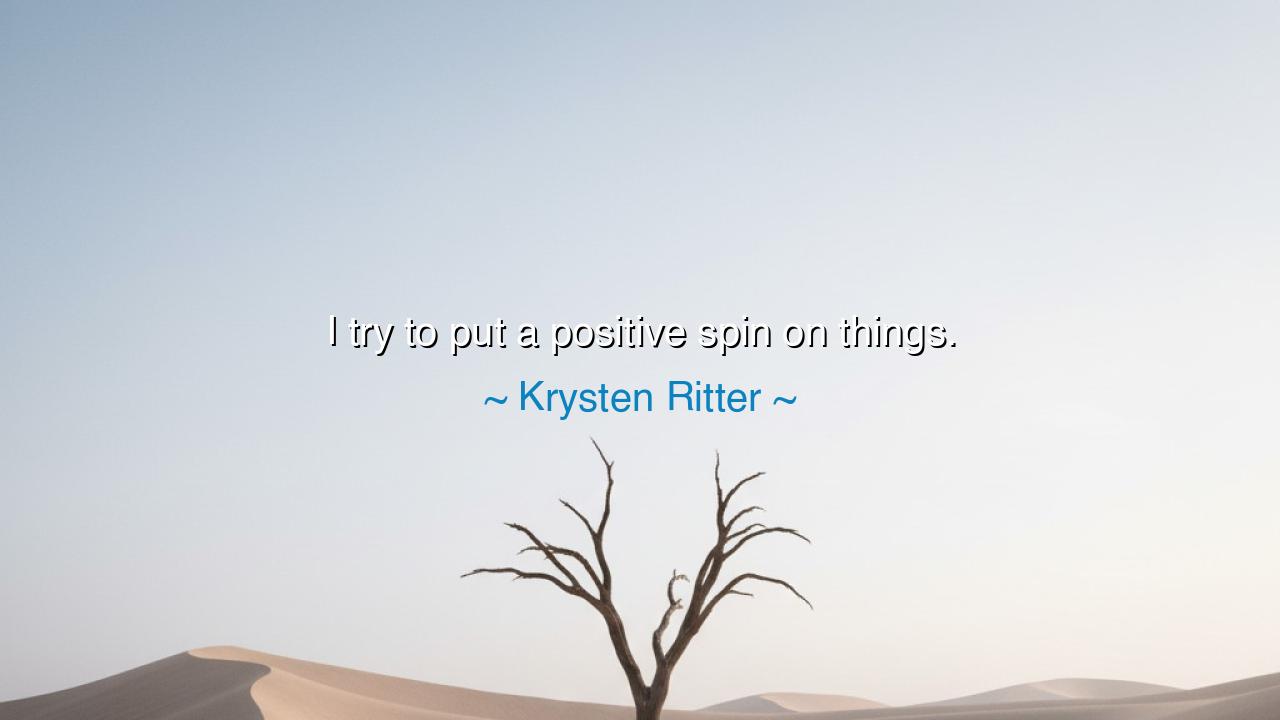
I try to put a positive spin on things.






Krysten Ritter speaks with simplicity, yet her words hold a profound truth: “I try to put a positive spin on things.” This statement is more than a casual remark; it is a philosophy, a discipline of the heart, a way of surviving in a world that often offers more thorns than roses. To put a positive spin is not to deny hardship but to transform perception, to take the rough stone of circumstance and polish it until it shines.
The ancients knew this path well. The Stoics taught that events themselves are neither good nor evil, but our judgments about them make them so. Thus, when Ritter speaks of turning difficulties into something bearable—or even hopeful—she aligns herself with a wisdom as old as the sages. To choose a positive spin is to refuse to be enslaved by fate, to declare that one’s spirit will shape meaning out of chaos.
Consider the story of Helen Keller, who was struck by blindness and deafness at the tender age of two. Many would have consigned her to silence and despair. Yet with the guidance of her teacher Anne Sullivan, she placed a positive spin on her condition. She learned to communicate, to write, and to inspire millions. Her disabilities became not chains but stepping stones, showing the world that the human soul can rise even from the deepest shadows.
So too do we see in Ritter’s words a call to heroism, though quiet and unassuming. Not all battles are fought with sword and shield; many are fought in the silence of the mind, where despair threatens to conquer. To choose a positive spin is to raise a shield of perspective, saying: “This trial may wound me, but it shall not master me. I will bend it to teach me strength, patience, or gratitude.” Such is the art of the resilient heart.
The lesson for us, O seekers of wisdom, is that every life will face storms. We cannot command the winds of fortune, but we may adjust our sails. To complain is easy; to despair is tempting. But the wise, like Ritter, learn to shift the story. They ask: “What gift hides in this hardship? What lesson waits to be seen?” Thus the bitter becomes tolerable, and even sorrow may serve as teacher.
Practically, this way of living can be cultivated. When hardship arises, pause and deliberately search for its hidden light. Keep a journal where, for every challenge, you write one positive spin—a hidden strength gained, a kindness revealed, a perspective widened. Speak gratitude aloud for even the smallest mercies. Over time, this practice reshapes the mind, so that optimism is no longer forced but flows naturally, like a river finding its way to the sea.
Therefore, let Krysten Ritter’s words echo across the ages: that life is not what happens to us, but how we choose to tell its story. To put a positive spin is to claim power over despair, to weave light from darkness, to turn stumbling stones into stepping stones. This is the way of the resilient, the strong, the wise. And it is a path open to all who dare to walk it.






CTVo cong thoai
I’m intrigued by the limits of putting a positive spin on things. Are there scenarios where optimism might backfire, such as in crisis management or conflict resolution? How does Ritter decide when to emphasize positivity versus when to address difficulties head-on? Examining these boundaries could provide insight into how to use positivity strategically while still engaging with reality effectively.
IIwa
This statement also prompts reflection on role modeling. How might Ritter’s positive outlook influence those around her, whether colleagues, friends, or fans? Can modeling optimism inspire others to adopt similar coping strategies, and does it foster a more supportive environment? Considering these social effects could highlight the broader implications of maintaining a consistently constructive perspective.
T9Duy Thang 9a8_18_Tran
Reading this makes me curious about the psychological impact of positivity. Does regularly framing experiences positively change how the brain perceives challenges, stress, or setbacks? Are there measurable benefits in terms of mental health or productivity? Exploring the science behind positive thinking could illuminate why this mindset is effective and how it can be cultivated in everyday life.
NNNhu Nguyen
I find this viewpoint inspiring, but it also raises questions about authenticity. Can always putting a positive spin sometimes feel forced or mask genuine emotions? How does Ritter ensure that positivity remains helpful rather than dismissive of valid concerns or struggles? Examining the nuances between genuine optimism and superficial positivity might reveal how best to encourage resilience without negating emotional honesty.
HTha tran
This perspective prompts curiosity about the strategies Ritter uses to maintain positivity. Does she actively reframe problems, focus on potential solutions, or rely on humor? How does consistently putting a positive spin influence her professional and personal relationships? Understanding the practical methods behind her optimism could offer lessons for others seeking to navigate adversity while maintaining a constructive and upbeat outlook.